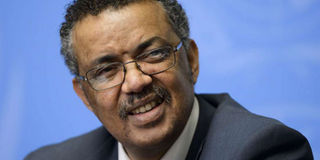Why Kenya supported Ethiopian for top WHO post

Former Ethiopian Minister of Foreign Affairs Tedros Adhanom Ghebreyesus who was on May 23, 2017 elected as new Director General of the World Health Organisation. PHOTO | FABRICE COFFRINI | AFP
Kenya pitched for Ethiopian Tedros Adhanom to be the next head of the World Health Organisation because he has “connections” with people who have suffered many health disasters.
In a speech to delegates attending the WHO General Assembly, Kenya’s Foreign Affairs Cabinet Secretary Amina Mohamed said Nairobi supports Dr Tedros Adhanom to be the next WHO Director-General as he represents the needs of the African continent and the developing world in general.
“Appointing a WHO Director-General from Africa provides the best opportunity to bring the world’s critical health challenges more clearly into focus,” she told the gathering at the UN headquatres in Geneva, Switzerland.
“A Director-General who is intimately connected with the communities, nations and regions of the developing world will inject a fresh perspective that will help to improve the global health situation,” she said.
The Assembly of the UN’s specialised body charged with healthy issues is held in Switzerland every year and is the decision-making body of the World Health Organisation (WHO).
It is attended by delegations from all 194-member nations of the World Health Organisation and its main function is to determine the policies of the Organisation as well as appointing the Director General.
Member states are meeting in Geneva for the 70th General Assembly While their agenda is on how to implement the Sustainable Development Goals.
Dr Tedros was elected to replace outgoing Margaret Chan who has completed her two terms.
Dr Chan, who was elected in in 2006, has seen the organisation praised and lambasted almost in equal measure in the way it handles public health issues.
For example, the WHO has been on the forefront in its global campaigns to lower HIV infections and has issued guidelines to combat diseases.
Recently, it declared the Yellow Fever vaccination, a lifetime protection, saving travellers the agony of having to pay for the jab every ten years.
But in 2014 during the Ebola crisis in West Africa, it was accused of sitting on its hands, and was criticised for having poor working relationships with other NGOs in health work during the outbreak, until it was too late to declare it a disaster. Over 11,000 people died.
A committee charged with investigating these failures found that WHO failed to implement its own International Health Regulations in responding to the epidemic.
Some critics also accuse the WHO of having a limited funding base that often cripples its response to disasters.
Now the African Union says having one of its own at the organisation could influence decisions to be faster.
Dr Tedros, an Ethiopian politician who served as Health Minister for seven years (2005-2012), and later Foreign Affairs Minister, is also a respected public health authority.
Last year, the African Union endorsed him as the sole candidate from the continent, boosting his chances to become the first African, non-physician head of the UN health agency.
Dr Tedros was born 52 years in Asmara, today’s Eritrea. A specialised researcher in tropical medicine, beat UK’s David Nabarro, 67, (current special adviser to UN Secretary-General on Climate Change) and Pakistani cardiologist Sania Nishtar (54) to become the new WHO boss.





